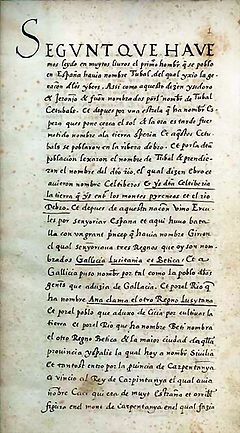
Chronicle of San Juan de la Peña
Encyclopedia

Kingdom of Aragon
The Kingdom of Aragon was a medieval and early modern kingdom in the Iberian Peninsula, corresponding to the modern-day autonomous community of Aragon, in Spain...
chronicle
Chronicle
Generally a chronicle is a historical account of facts and events ranged in chronological order, as in a time line. Typically, equal weight is given for historically important events and local events, the purpose being the recording of events that occurred, seen from the perspective of the...
written in Latin around 1370 in the monastery of San Juan de la Peña
San Juan de la Peña
The monastery of San Juan de la Peña is a religious complex in the town of Santa Cruz de la Serós, at the south-west of Jaca, in the province of Huesca, Spain. It was one of the most important monasteries in Aragon in the Middle Ages. Its two-level church is partially carved in the stone of the...
at the behest of Peter IV of Aragon
Peter IV of Aragon
Peter IV, , called el Cerimoniós or el del punyalet , was the King of Aragon, King of Sardinia and Corsica , King of Valencia , and Count of Barcelona Peter IV, (Balaguer, September 5, 1319 – Barcelona, January 6, 1387), called el Cerimoniós ("the Ceremonious") or el del punyalet ("the one...
. It was the first general history of Aragon and was probably designed both to justify the royal prerogatives of the Crown of Aragon
Crown of Aragon
The Crown of Aragon Corona d'Aragón Corona d'Aragó Corona Aragonum controlling a large portion of the present-day eastern Spain and southeastern France, as well as some of the major islands and mainland possessions stretching across the Mediterranean as far as Greece...
against the baronage and to match the comparable Castilian
Kingdom of Castile
Kingdom of Castile was one of the medieval kingdoms of the Iberian Peninsula. It emerged as a political autonomous entity in the 9th century. It was called County of Castile and was held in vassalage from the Kingdom of León. Its name comes from the host of castles constructed in the region...
work of a century earlier, the Estoria de España
Estoria de España
The Estoria de España, also known in the 1906 edition of Ramón Menéndez Pidal as the Primera Crónica General, is a history book written on the initiative of Alfonso X of Castile "El Sabio" , who was actively involved in the editing...
.
The Chronicle is a compilation from various sources, some more historically solid than others. Though named after the monastery of San Juan, it was only partially compiled there. As early as 1345 Peter IV had asked the monasteries of San Juan and Ripoll
Ripoll
Ripoll is the capital of the comarca of Ripollès, in the province of Girona, Catalonia, Spain. It is located on confluence of the Ter River and its tributary Freser, next to the Pyrenees near the French border...
to begin compiling material for a general history of the realm. Ripoll's only contribution was a version of the 1162 Gesta comitum Barchinonensium updated to 1310. Only those sections (approximate a third) dealing with events specific to the monastery were probably written in it. The monks of San Juan relied heavily for the history of Spain up to 1137 on De rebus Hispaniae, the work of the Navarrese Rodrigo Jiménez de Rada
Rodrigo Jiménez de Rada
Rodrigo Jiménez de Rada was a Navarrese-born Castilian Roman Catholic bishop and historian....
. The materials compiled at Ripoll and San Juan were eventually sent to Barcelona
Barcelona
Barcelona is the second largest city in Spain after Madrid, and the capital of Catalonia, with a population of 1,621,537 within its administrative limits on a land area of...
to be worked together. A finished copy of the work was sent by the king to the Cathedral of Valencia in 1372 and this original still resides in the cathedral library.
A modern Spanish
Spanish language
Spanish , also known as Castilian , is a Romance language in the Ibero-Romance group that evolved from several languages and dialects in central-northern Iberia around the 9th century and gradually spread with the expansion of the Kingdom of Castile into central and southern Iberia during the...
translation by Antonio Ubieto Arteta appeared in 1964, an English
English language
English is a West Germanic language that arose in the Anglo-Saxon kingdoms of England and spread into what was to become south-east Scotland under the influence of the Anglian medieval kingdom of Northumbria...
translation by Lynn H. Nelson in 1991.

